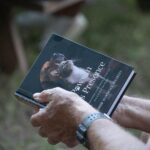There are so many beautiful stories in the Bible, and one of my favorite is found in 2 Samuel chapter nine. It is the story of David and Mephibosheth. In the thirteen verses that comprise the chapter, we see a glorious picture of the Gospel. But this week as I studied the passage again, God opened my eyes to see an important truth: sometimes what we see as weakness and failure, may actually be God’s mercy and protection at work in our lives.
As the chapter begins, King David is looking for someone from the house of Jonathan to whom he can show God’s favor and kindness. We see a king whose heart is overflowing with gratefulness and humility to the God who called him from the fields among sheep, to the throne as the shepherd-king over Israel. We also see the heart of a man who is grieving for his best friend; undoubtedly longing to be able to share this incredible moment with his most trusted friend, advisor and encourager.
David’s search leads him to a most unlikely recipient. He is told of Mephibosheth, the lame son of Jonathan. As a child, Mephibosheth was dropped and suffered permanent damage to his feet. (Do you catch that Gospel picture: he suffered permanent damage from “a fall”; damage he could not fix himself, and a king that went in search of him to restore him).
Mephibosheth goes before his king, surely fearful and confused. He must have been thinking: What does he want with me? Is he going to kill me for being the grandson of the former king; the man who tried many times to kill him?
Yet, Mephibosheth is met with nothing but grace, mercy and blessings. Land is restored to him, a place at the king’s own table is prepared for him, and best of all, from that day on, Mephibosheth was treated as David’s own son.
I have read this story many times before, but what stood out to me as we studied it in Bible study this week, was how merciful God was in allowing Mephibosheth’s lameness. It was most likely his lameness that kept him from being caught up in a battle similar to the ones that took the lives of his father and grandfather. It was most likely his lameness that kept him away from the deadly power struggles so common to kingdom’s in those days. And it was his lameness that kept him home to answer the summons from the king.
His “weakness” therefore could easily be seen as God’s mercy. But did it feel like mercy as he suffered the initial injury? How could it have? Did it feel like grace when Mephibosheth was growing up, unable to do things that the other boys could do? I’m sure it did not. Did it feel like God’s blessing on him when he was ridiculed by his peers for being different? I cannot imagine it did. But did God love him enough to provide the means necessary for him to receive unimaginable blessings and favor? Absolutely.
We can all related to Mephibosheth. First, in our need to be restore and redeemed. But also, in the fact that we are all “lame” in some way; whether an actual disability, or in our insecurities, illnesses, financial situations, job issues, family problems, prodigal children, broken dreams, wounded hearts, etc.
But like Mephibosheth, is it possible that what we have always viewed as a weakness or burden, is actually God’s blessing on us? Could God be allowing whatever hurt you are dealing with, to be the catalyst to draw you to Him so that you can receive His blessing? Could the weakness you lament over, actually be God’s protection over you? Could your disappointments be God’s leading you to something that is ultimately better for you or your loved ones?
May I challenge you today, as I continue to challenge myself, to ask God to open your eyes to see His mercy, grace and blessings in your life, even if they are hidden in weakness, pain and brokenness. After all He is the God of restoration, and there is no heart that is beyond His power of restoring.
Today, may we rest in the loving arms of the God who loves us so much, even in our brokenness, that He pursues us in order to restore us to Himself. What an amazing God we have!






